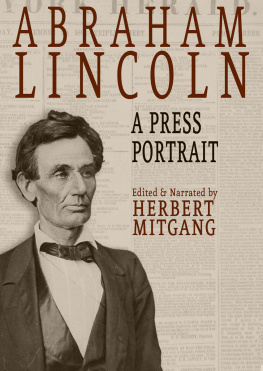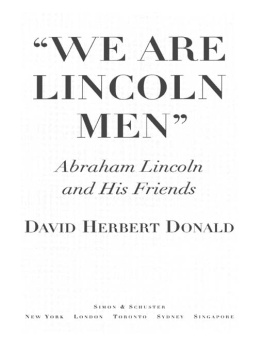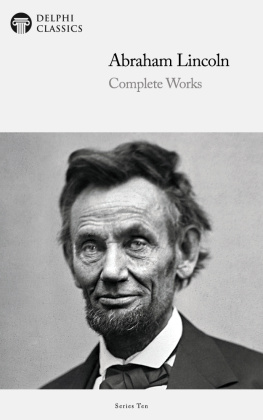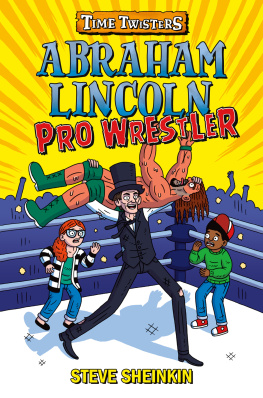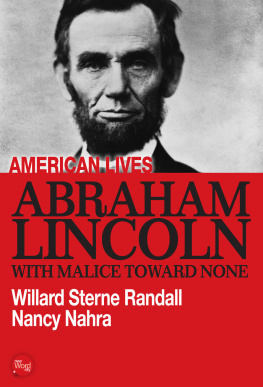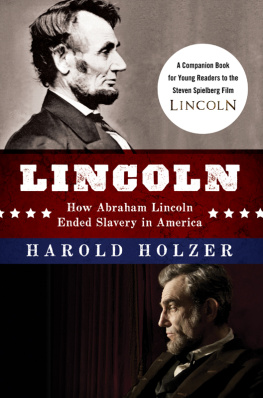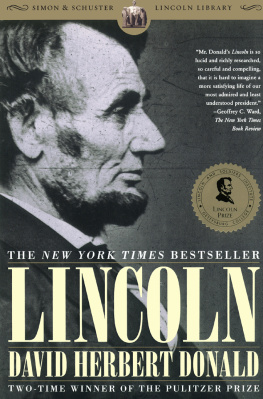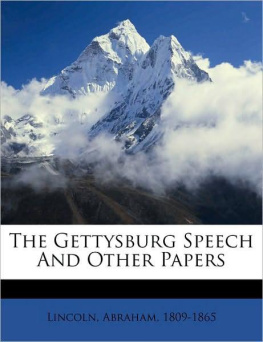ABRAHAM
LINCOLN
A Press Portrait
His Life and Times
from the Original Newspaper Documents
of the Union, the Confederacy,
and Europe
Edited and narrated by
HERBERT MITGANG
ALSO BY H ERBERT M ITGANG
BIOGRAPHY
THE FIERY TRIAL: A LIFE OF LINCOLN
THE MAN WHO RODE THE TIGER: THE LIFE AND TIMES OF JUDGE SAMUEL SEABURY
REPORTAGE
FREEDOM TO SEE: TELEVISION AND THE FIRST AMENDMENT
LITERATURE
WORKING FOR THE READER: A CHRONICLE OF CULTURE, LITERATURE , WAR AND POLITICS IN BOOKS
WORDS STILL COUNT WITH ME: A CHRONICLE OF LITERARY CONVERSATIONS
HISTORY
THE LETTERS OF CARL SANDBURG
AMERICA AT RANDOM: TOPICS OF THE TIMES
WASHINGTON, D.C. IN LINCOLNS TIME
SPECTATOR OF AMERICA
CIVILIANS UNDER ARMS: STARS & STRIPES, CIVIL WAR TO KOREA
ONCE UPON A TIME IN NEW YORK: JIMMY WALKER, FRANKLIN ROOSEVELT, AND THE LAST GREAT BATTLE OF THE JAZZ AGE
NEWSMEN IN KHAKI: TALES OF A WORLD WAR II SOLDIER CORRESPONDENT
FICTION
THE RETURN
GET THESE MEN OUT OF THE HOT SUN
THE MONTAUK FAULT
KINGS IN THE COUNTING HOUSE
PLAYS
MISTER LINCOLN
ADLAI, ALONE
Introduction to the 2000 Edition
Whenever Im in Springfield to visit Lincolns hometown and pursue the latest discoveries about his life, family, legal career, and presidency, I head for a newsstand and pick up a copy of the Sangamo Journal and the State Register. I like to see what both Simeon Franciss pro-Lincoln paper and what the pro-Douglas paperwhich Stephen Douglas himself establishedhave to say. It makes for a neat political balance. The Journal spoke for the Whigs and later the Republicans, the Register for the Democrats.
Then, once again, comes a shock: Im dreaming in the wrong century. The two independent newspapers no longer exist, except as one merged publication, the State-Journal Register, with an out-of-town ownership. Nothing unusual about that in the broad field of communications in the new century. The same can be said for other newspapersnot to mention the television networks and conglomerated book and magazine publishersall over the United States. In Lincolns time, for example, New York City had ten daily newspapers; today, it has only one broadsheet, The New York Times, and a couple of warring tabloids.
In a lecture delivered to his neighbors in Springfield long before he became known nationally, Lincoln said: At length printing came. It gave ten thousand copies of any written matter quite as cheaply as ten were given before; and consequently a thousand minds were brought into the field where was but one before. This was a great gainand history shows a great change corresponding to itin point of time. I will venture to consider it the true termination of that period called the dark ages.
In a talk delivered in Columbus a year before his nomination, Lincoln said: Public opinion in this country is everything. He realized that voters could be convinced at that time in only two waysby voice (as in the Lincoln-Douglas debates) and by the press. The unamplified voice and the newspapers had at least one virtue: you could not punch up the worldwide web on a computer and get a busy signal.
Before pollsters, exit polls, ghostwriters, and spinmeisters, Lincoln recognized that the free press could lead to an educated public. With some noble exceptions, news is more partisan and limited these days but without being as independent. Like McDonalds hamburgers, some cynical journalists call the bland reports McNews. Or, if really boring, McSnooze.
Nobody could be bored reading the old Register and Journal. Early in Lincolns career, the Register reprimanded him for his humor, calling it assumed clownishness. In the mid-twentieth century, similar criticism was leveled against Gov. Adlai E. Stevenson of Illinois when he ran for president in 1952 and 1956 and was branded an egghead who talked over the heads of the peoplea falsehood that insulted the intelligence of many American voters.
The Register called Lincoln the ineffable despot, who, by some inscrutable dispensation of providence, presides over the destinies of this vast republic. When Lincoln ran for a second term, the Register said, The doom of Lincoln and Black Republicanism is sealed. Corruption and the bayonet are incompetent to save them. The Journal responded by calling Charles Lanphier, the Registers editor, the agent of Jeff Davis who presides over the Copperhead sheet in this city.
It was raw stuff but enlightening and, in retrospect, fun to read.
By a little stretch of the imagination, its possible to say that Lincoln was once a newspaper publisher himself. He actually owned his own newspaper brieflya little-known chapter in his career, and one that he deliberately concealed from the public. It was the German-language Illinois Staats-Anzeiger. Under a secret contract drawn by Lincoln himself in 1859while he was busy lining up support for the Republican nomination for presidentany time that Theodore Canisius, the owner of the paper, failed to espouse the Republican line, Lincoln could reclaim its type and press. (The document of ownership gave the price as $400.) The paper, of course, was designed to convince German voters to toe the party line. Both parties to the deal held up their ends of the bargain. Before his inauguration, Lincoln sold back the paper to Canisius. Once in office, Lincoln paid off the support by naming Canisius the American consul in Vienna.
Its interesting to note thata century before A. J. Liebling, the New Yorker press critic, said it cynicallyLincoln was aware that freedom of the press is guaranteed only to those who own one.
So it went from city to city with the outspoken party press. The Chicago Tribune was for Lincoln; the Chicago Times against; the Cincinnati Daily Commercial was for; the Cincinnati Enquirer against. The Louisville Journal had been one of Lincolns favorite newspapersHe studied and paid for it when he had not money enough to dress decently, said James Quay Howard, who interviewed many of Lincolns old friends. The Louisville paper played it down the middle for a Kentucky boy, saying, We do not concur with him in some of his views, but there is much good in Abrahams bosom.
Most of the secessionist papers were vitriolic about the Black Republican in the White House. But the Upper South had a newspaper in Knoxville with a memorable logotype: Brownlows Whig and Rebel Ventilator. It was edited by Parson Brownlow, who was a great supporter of President Lincoln and his wartime aims.
Lincoln was devoted to newspapers. With no harm done to the newsprint, he read the big city papers from all over the country before delivering them when he was the New Salem postmaster. Moreover, he served as a newspaper agent, collecting money from subscribers, a little-known fact that can be found in the Sangamo Journal of October 31, 1835. On page 1 theres a notice from Simeon Francis dunning his subscribers. In the statewide list appears the name A. Lincoln, Esq., as the agent for New Salem. Then as now, the practice of double-dipping by an officeholder was not unheard-of.

